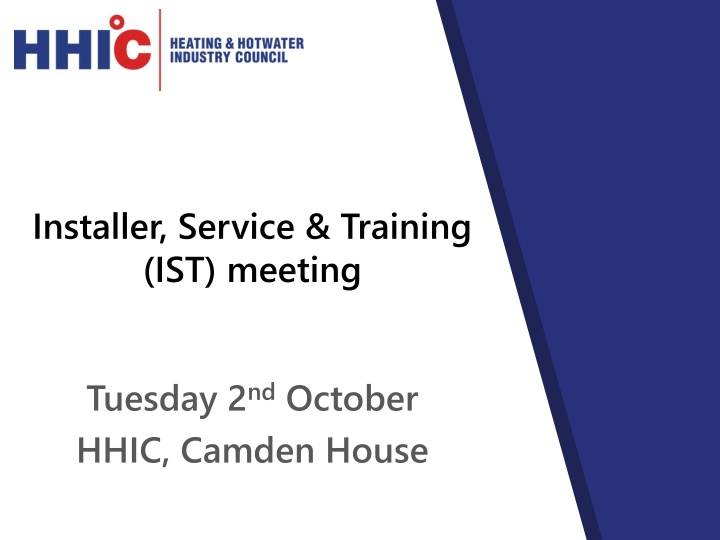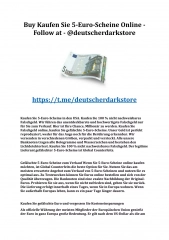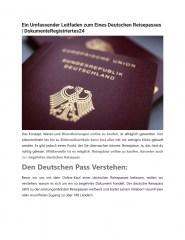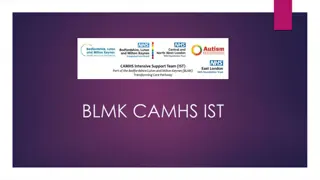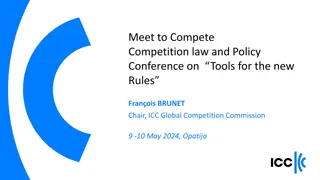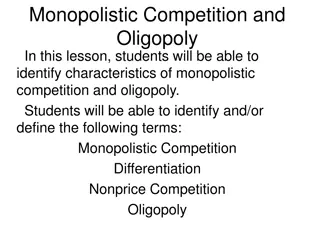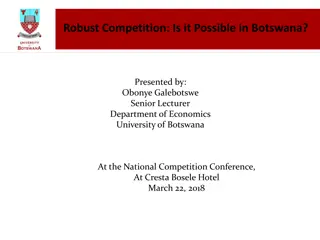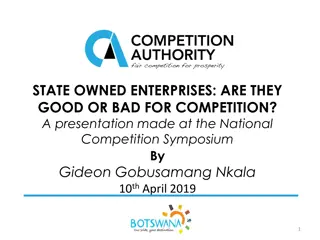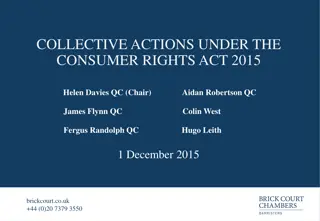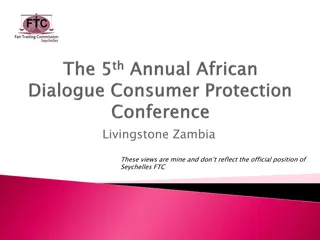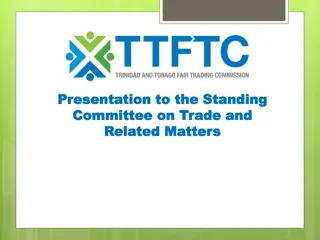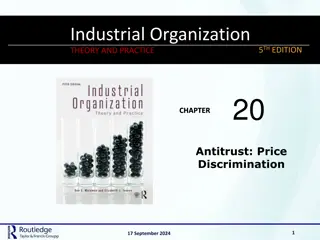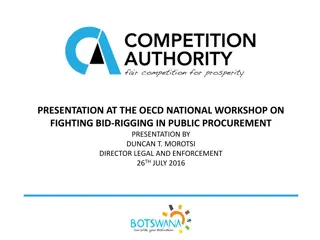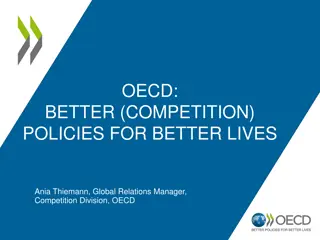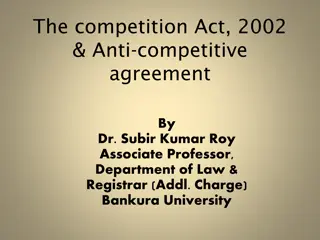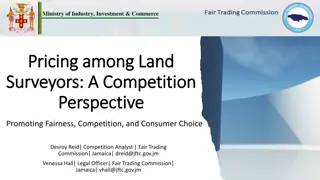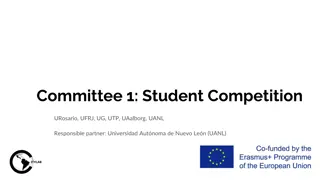IST Meeting Summary: Welcome, Competition Act, Matters Arising
In this meeting summary, members received apologies, discussed compliance with The Competition Act, and reviewed various matters arising from past meetings, including proposed actions and resolutions.
Download Presentation

Please find below an Image/Link to download the presentation.
The content on the website is provided AS IS for your information and personal use only. It may not be sold, licensed, or shared on other websites without obtaining consent from the author.If you encounter any issues during the download, it is possible that the publisher has removed the file from their server.
You are allowed to download the files provided on this website for personal or commercial use, subject to the condition that they are used lawfully. All files are the property of their respective owners.
The content on the website is provided AS IS for your information and personal use only. It may not be sold, licensed, or shared on other websites without obtaining consent from the author.
E N D
Presentation Transcript
Installer, Service & Training (IST) meeting Tuesday 2ndOctober HHIC, Camden House
1. Welcome and Apologies Apologies received from: Trevor Batt Corgi Technical, Matt Edwards Swale Heating, Sean Keleher Atag, Paul Greengrass Pump House, John Francis InstaGroup, Neil Cafearo - Baxi
2. The Competition Act Members are reminded of the requirements of The Competition Act: As a reputable trade association, HHIC s meetings must comply with the requirements of The Competition Act. This means that we must avoid any discussion that could be construed as being anti-competitive and in particular there must be no discussion about pricing of products and services. By attending this meeting and having your names included in the minutes, all participants confirm that they agree to comply with this policy.
3. Matters Arising (June 19th) HHIC to circulate final generic inhibitor test proposal upon receipt To be circulated NM to remain in contact with Martin Garbutt (LBF deputy chair) on supporting LBF idea to raise awareness with the wider construction industry on GSIUR Regulation 8 (alterations to premises etc.) Complete, HHIC article published in August H&V News. LBF plan to revisit the topic as a key theme with IGEM, Gas-Safe & partners for GSW 2019 http://digitalissues.hvnplus.co.uk/2018/Aug/index.html - page 19 (flash player required) Access to standards what options exist or could be pursued, particularly for non-gas standards which are relevant to heating engineers (e.g. BS 7593)? discussed again at SCF, suggestion from OPGO that for small increase to RGE fee, access could be given? HSE believed to be resistant to raising fees, Trevor Smallpeice (SCF chair) to revisit with HSE now Capita confirmed to continue as Gas Safe Register operator
3. Matters Arising (June 19th) Siloxanes HHIC to raise again at IGEM Gas Quality Working Group meeting on June 21st Complete (extract of IGEM gas quality working group minutes seen below)
3. Matters Arising (June 19th) 1) Job record template - ACTION: NM to feedback to sub-group Complete next BMG sub-group meeting scheduled for 22ndNovember 2) ACTION: HHIC to circulate draft consumer advice leaflet on frozen condensate Complete, covered by agenda 3) Times article (industry response) frozen condensate ES suggested that HHIC could use The Times, who ran an article criticising industry response to freezing condensate, to spread best-practice and consumer guidance on these matters, appropriate if The Times truly had consumer-interest at heart. ACTION: HHIC to discuss with media team Complete - not felt to be viable. The Times have since run several other damning and ill-informed articles concerning the heating industry, boiler efficiency etc.
3. Matters Arising (June 19th) 4) Boiler case grommets - To inform engineering judgement, DMF commented that there may be some value in the issue being considered by the Unsafe Situations panel. ACTION: NM to feedback to Martin Garbutt Complete 5) External Wall Insulation (EWI) JF advised that his business were very active with EWI work and had produced their own internal guidance of this type. ACTION: JF to share with HHIC for circulation if possible no update, remains open NM has previously been sent a general EWI guidance document which does reference fixing to the EWI material, which alongside manufacturers instructions for the specific material/product used, may help with the queries raised. ACTION: NM to circulate - Complete 6) Gas pressure - ACTION: NM to circulate HHIC paper to group (presented to SCF) - Complete
3. Matters Arising (June 19th) 7) ACTION: NM to circulate Laurah s PR report Complete
4. Gas Safe Register Technical Bulletins (TB s) TB 118 TB 102
5. Frozen boiler condensate Update from Steve Sutton (HHIC) on progress; group review of latest draft guidance documents, inc. diagrams
5. HHIC proposal to SCF Frozen condensate HHIC proposal for IG/1 amendment circulated and presented to SCF (existing training specification text seen below, with proposed new text beneath in bold): K5 Suitable arrangements for the removal and disposal of condensate (where applicable), including hierarchy of condensate disposal methods (i.e. internal connection to a foul drain within the thermal envelope of the building wherever reasonably practicable); appropriate measures to provide effective protection against freezing in all cases
6. Standards Consultation Forum SCF update IG/1 still many training providers not approved , those successfully audited to be listed on EU Skills website. IGEM keen to encourage common acceptance of typical training durations , as guidelines only SSB document may inform tender document for SSB function. Comments? GN8 document SCF chair to revisit with SMB to ensure that SCF views have been taken account of. Members to comment with any objection, the reason why, and an alternative proposal. Some concerns that training is being mandated in all cases when it may not always be required?....... Example: heating installer who has worked with gas meters day in day out for years (removing to solder, refitting, working pressure check etc.), but who would be required to undertake training for MET1 assessment? CB s concerned that 1stOctober is imminent (here!) and clear guidance should have been established by now
6. Standards Consultation Forum SCF update Gas-Safe-Register recognise 2 companies for the inspection of shared flues No changes to matters of gas safety required to accommodate GSIUR Regulation 36 change, 26(9);c will introduce a change Do engineers realise that if they undertake the NG/LPG changeover qualification, and hold HTR1, they are not competent to work on LPG fires in caravans etc. (e.g. Widney gas fire) without HTRLP2? Safe isolation open action on technical working group (TWG) to discuss. Electrical Safety First guidance document reviewed, but felt to be aimed more at electricians to begin with. Felt that any initial change in emphasis would need to apply to all competence categories, e.g. focusing on VoltAlert/safe-isolation, with perhaps heating engineers undertaking (voluntary) greater training/assessment on resistance checks etc. Reassessment proposal at a standstill, action to restart process
6. Standards Consultation Forum SCF update Scottish funded work to develop products (more detailed specifications) from the revised NOS produced last year. Request for input/volunteers. It was raised by one member that there is a lack of interest from gas networks / ESP s in built-over natural gas services, an At Risk classification by the GIUSP, but where turning off the gas is not required as it does not improve the safety level. Would the meter asset manager hold more of an interest?
6. Question/thoughts? Industry skills Questions for the HHIC IST group: What is your perspective on a potential industry skills shortage? How can we attract new entrants through apprenticeships etc?
7. Standards update BS 6891 (specification for domestic gas installation pipework) Impasse remains over removal of clause requiring a test point to be installed at the point of appliance connection (when an appliance is installed), if a suitable test-point does not already exist (appliance-integral may still be deemed OK if internal pressure loss is known to installer, i.e. published by manufacturer) After consultation of all relevant members, HHIC support removal of the clause, no technical reason has been given for introducing the new requirement Due for review and potential resolution at GSE/30 parent committee meeting in October
7. Standards update BS 7593 Formal objection raised by one panel member over clause 6.2 (water softeners & heating systems), had delayed public consultation until 6thSeptember. DPC now open until 6thNovember, with 3 potential options given for clause 6.2: 1) The current Clause 6.2 in the draft circulated for approval to DPC (agreed by vast majority of panel members) 2) Alternative suggested wording 3) Current text in 2006 version of this standard
7. Standards update BS 7593 Current clause wording is to essentially state that it is not common best practice to fill systems with softened water, but that additional advice from a manufacturer can be sought (in line with industry-agreed HHIC position on this topic)
7. Standards update BS 7593 Other key changes include the guidance that an in-line system-filter should be installed, and that inhibitor concentration should be checked annually, and topped up periodically (max 5 year intervals between re-dosing), or a full lab- test undertaken Scope extended throughout to encompass hydronic cooling systems, alongside heating systems http://standardsdevelopment.bsigroup.com/projects/2017-03900
7. Standards update UP/17 IGEM UP/17 Shared Chimney & Flue Systems for Domestic Gas Appliances comments received during public consultation have now been addressed and the draft approved by IGEM GUC and TCC. Publication expected imminently. HHIC article on shared flues published in HPM magazine (June), looking to raise awareness of both UP/17 and shared flue considerations in general (flash player required): http://www.hpmmag.com/digitaleditions/hpm-jun-2018/#/28/ We have had recent contact with Registered Gas Engineer magazine (RGE), who seem likely to run an ISU for UP/17, and have expressed some interest in republishing or adapting the HHIC content for a combined feature (TBC) HHIC have now heard anecdotally from two different HHIC member sources that there is a trend towards decommissioning the shared ducts and re-siting individual appliance flues to external walls, where this is possible.
8. Benchmark Proposed online Benchmark, in partnership with Capita, has been put on hold, due to protracted negotiations and the uncertainty around the awarding of the next Gas Safe Register contract by HSE (now confirmed as Capita on a 5-year contract) A full update of the scheme is planned, and an initial scoping document to inform the hiring of a dedicated member of HHIC staff, or use of a consultancy, will be produced. A full review of scheme aims, objectives, documentation, future direction etc. will then be undertaken, in consultation with members
9. Gas Safety Week 2018 HHIC direct activity: Agreement in principle reached for gas appliance manufacturing members (boilers, fires) to place gas safety messaging on their appliance packaging Several issues still to work through and investigate further, including logistical and supply-chain considerations for different markets, such as the ROI (where Gas Safe Register do not operate), and Europe
9. Gas Safety Week 2018 Potential?
9. Gas Safety Week 2018 HHIC direct activity: Top tips for Gas Safety Week (online blog/press): 1) Maintain your appliances (regular servicing & maintenance) 2) Complete the Benchmark commissioning document (e.g. CO/CO2 checks for TB 143 compliance) 3) Check your engineers credentials (that they are Gas Safe registered and competent to do the work) 4) Don t sign off gas work illegitimately undertaken by others (or undertake gas work without the relevant competence) 5) Safe electrical isolation always work safely around heating electrics 6) Don t DIY it, use a professional 7) Avoid potentially counterfeit or substandard spare parts, ask for genuine spare parts for your boiler
10. Gas pressure HHIC attended draft output report comments resolution session on 27th September WG chair comment that it could be late 2019 before any meaningful output and/or implementation is realised The GDN s plan to hold a meeting with IGEM on this topic, hopefully by the end of 2018 Noted by several parties that the ESP procedure described does not align with the proposed common test methodology. Said to be work in progress , not final recommendations The 6 minute averaged test-duration was felt to be unnecessary, nobody present clear where the currently advised 6 min duration of ESP testing originates from, rationale etc. Acceptance that the appliance manufacturer is entitled to specify what they require for safe and proper commissioning of their appliance Further discussion of Regulations and standards (hierarchy?). UK GAR communication advises minimum 18.5mb meter outlet pressure, other parties advise 18mb is in relevant standards as an absolute minimum?
10. Gas pressure Discussion that progress is dependant on agreeing a common test method. Whether all appliances are operated, and what rate, is key, including at the commissioning stage for new appliances 1 in 20 definition to be included in report. There is a technical definition in relevant standards, but also said that it may be helpful to provide a meteorological one also. 1 in 20 conditions should be obvious to an engineer (extreme cold/weather). All HW taps should be operated to negate, or reduce to a minimum, combi boiler modulation Historical Cadent project analysing real-time appliance gas flows, network heat loads etc. will be used to inform amendment to appendix 5 of GL/1 (network design standard). IGEM will fund this work, are new demand curves/peaks necessary?
10. Gas pressure A concern raised by metering parties that if abnormal load is created for pressure testing (e.g. all appliances at full-rate), any subsequent adjustment of the meter regulator to try to achieve correct meter outlet pressure could lend itself to over-gassing of appliances, if/when regulator inlet pressures return to normal? Are current network design/renovation procedures adequate, or is quality control an issue?....e.g. are the correct service pipe relining diameters known to contractors but not always adhered to?
11. Gas Quality Hydrogen HyDeploy HHIC participating in technical governance of project, bound by NDA currently, project progressing well. HyDeploy2 will look to repurpose project assets, e.g. electrolyser Hy4Heat ITT for WP4 (appliance development) closing imminently HHIC have written to Arup/Hy4Heat to reiterate the importance of BSI standards (e.g. BS 6891) to the project (not just IGEM standards). Response received see next slide Siloxanes As per update in matters arising . No date currently for next IGEM Gas Quality Working Group meeting, HHIC to chase again if update on stakeholder event not forthcoming soon.
11. Gas Quality Arup/Hy4Heat reply to HHIC query (BSI standards) 23rd August Thank you for your email and for raising this important point. We are aware of the importance of considering all BS standards, not just for certification, but for installation as well. As part of the IGEM work, they are to fully engage with BSI to understand and highlight the impacts their work will have on these standards. At this point we will have a better understanding of what work needs to be undertaken in this area. We have had several meetings with BSI, on both certification and all standards and are currently looking at how these fit into the programme and when. Heidi Genoni, who I believe you will have met, is the Programme Manager and looks after the full scope of the Hy4Heat programme (rather than the scope of individual WPs). I have passed on your email and a member of the team will be in touch with more information in the near future when we have any developments we can share on this.
12. Govt. review of CO alarm requirements for homes in England Carbon Monoxide Alarms (Extract from HHIC notes of FIA meeting in July) There will be a formal review of whether CO alarm requirements in Building Regs (England) are fit for purpose Housing Regulations may also be encompassed, or touched by this Costs vs benefits will be assessed and this will span tenures as well as fuel-types. Some comment that currently the figures (statistics) may not support a change, but acknowledgment there may be some under-reporting and that low-level prolonged CO exposure is being looked at elsewhere currently Consultation hoped for later this year or early 2019 May look at regulatory and non-regulatory options New CO alarm standard (EN 50291) and installation standard (EN 50292?) MHCLG advised it is anticipated a view on any potential Regulation change may be known by Spring 2019 https://www.gov.uk/government/news/government-to-launch-review-into- carbon-monoxide-alarms
12. Which? magazine CO alarm campaign Email from Which? to HHIC (15thAugust) .. .I'm getting in touch to let you know of some plans Which? has to raise awareness of the dangers of Carbon Monoxide among our members and the public at large. We have arranged to give away 1,000 free Best Buy CO alarms during the month of October through our Which? Trusted Trader scheme. We will be publicizing this in our annual boilers article in October, and also in several online publications during September and October. We will shortly be contacting boiler manufacturers and boiler servicing contract providers in the UK to inform them of our plans, and to invite them to take action to better protect their own customers from the dangers of Carbon Monoxide . https://www.which.co.uk/news/2018/09/nearly-four-in-ten-british-households- dont-have-a-carbon-monoxide- alarm/?utm_campaign=whichukt&utm_medium=social&utm_source=twitter&ut m_content=coalarms&utm_term=twnews
13. EPBD amendments Revision of EPBD; Article 20 Information (10) In Article 20(2), the first subparagraph is replaced by the following: 2. Member States shall in particular provide information to the owners or tenants of buildings on energy performance certificates, including their purpose and objectives, on cost-effective measures and, where appropriate, financial instruments, to improve the energy performance of the building, and on replacing fossil fuel boilers with more sustainable alternatives. Member States shall provide the information through accessible and transparent advisory tools such as renovation advice and one-stop-shops. . In case a technical building system is installed, replaced or upgraded , the overall energy performance of the new part or the whole system is assessed, and the results are documented and shared with the building owner. Such an assessment can be used in energy performance certificates.
13. EPBD amendments Revision of EPBD; Article 8 - Technical building systems, electromobility and smart readiness indicator .. Member States shall require new buildings, where technically and economically feasible, to be equipped with self-regulating devices for the separate regulation of the temperature in each room or, where justified, in a designated heated zone of the building unit. In existing buildings, the installation of such self-regulating devices shall be required when heat generators are replaced, where technically and economically feasible.
13. EPBD amendments Article 14 EPBD widens the scope for the inspection of heating systems beyond boilers and now includes all heat generators. At the same time, an inspection is only mandatory for heating systems with an effective rated output for space heating or for combined space heating and ventilation purposes of over 70 kW, such as the heat generator, control system and circulation pump(s) used for heating buildings . Member States managed to retain the option to use adequate advice to users as an alternative to inspections in the final text, against the wishes of the European Commission and Parliament. For residential buildings, Member States are encouraged (but are not obliged) to set requirements for electronic monitoring (tracking consumption and maintenance alert, when necessary) and control functionalities to optimize energy use. If a building automation and control system is present in a commercial building or electronic monitoring in a residential building, the revised EPBD exempts those heating systems (above the 70kW threshold) from any inspection. Heating systems below this threshold (70KW) are also no longer subject to a heating inspection in the revised EPBD.
13. EPBD amendments Should you wish to review the full 2010 recast of the EPBD, and/or 2018 amendments, the links are provided below (they take a while to load): EPBD 2010 recast - https://eur-lex.europa.eu/legal- content/EN/TXT/PDF/?uri=CELEX:32010L0031&from=EN 2018 EPBD amendments - https://eur-lex.europa.eu/legal- content/EN/TXT/PDF/?uri=CELEX:32018L0844&from=EN
13. Policy update - EPBD EPBD summary (extracted from HHIC notes of FIA meeting in July) From recent publication in the OJEU, MS have 20 months to transpose to national law, which could fall within a Brexit transition period. If a deal is struck with the EU then we will have to adopt and implement Information is to be provided to the building owner when renovated, such as a record of work, unclear if this would include an update to the EPC? A primary energy metric will be used instead of carbon PD advised that the Directive will now require that TRV s are installed at the time of heater replacement in domestic buildings, no mention of how the accompanying legislative where technically and economically feasible text might be interpreted by a UK transposition Nearly-Zero-Energy-Building requirement (EPBD) remains, by January 2021 for domestic properties PD has asked the Building Regulation Advisory Committee (BRAC) to set up industry engagement groups for this review, this being advised as the most appropriate way for HHIC (and others) to engage and seek to shape the transposition of EPBD and update of Part L
13. Policy update PAS 2035 PAS 2035 specifies the requirements for the retrofitting of dwellings including their assessment, identification, evaluation of improvement options, design and specification of energy efficiency measures, together with the monitoring and evaluation of retrofit projects. The first draft of the revised PAS 2035 has been posted on the BSI website for public comment. The link to the document on the BSI web pages can be found here.Click on READ DRAFT.
13. Building Regulations & SAP Forthcoming consultation on Part L of the Building Regulations expected this winter, and that it will be published alongside a more current SAP 10.01 (e.g. with updated fuel factors), to consider official adoption of SAP 10. Revised Part L expected to be published October 2019 or April 2020, alongside SAP 10.02
13. Building Regulations & SAP Scottish Building Standards consultations: https://consult.gov.scot/local-government-and-communities/compliance-and- enforcement-and-fire-safety/ CLOSED https://consult.gov.scot/local-government-and-communities/building-standards- energy CLOSED EPC call for evidence open until 19th October https://beisgovuk.citizenspace.com/home-local-energy/epc-call-for-evidence/
13. Building Regulations & SAP HHIC are due to attend the next FIA meeting in Wales on October 30th, do members have any specific issues/questions to raise with the Welsh Government?
14. IGEM RIDDOR workshop Following the IGEM workshop in August, HHIC s understanding is that two separate potential options are now proposed for the HSE to consider: 1) All ID situations attributable to poor workmanship to be RIDDOR reportable (believed to be HSE s preferred approach at this time), to aid identification of key risks to society and the analysis of any trends, which would then seem likely to need some degree of filtration by Gas-Safe and/or HSE, to identify those occurrences which truly posed a risk of death, being taken to hospital etc. 2) More prescriptive guidance as to what is RIDDOR reportable under RIDDOR regulation 11(2), perhaps with practical examples (TBC) of ID situations likely to result in death, or persons being taking to hospital, and in keeping with the perceived original intent of RIDDOR regulation 11(2)
15. Combustion readings required to confirm safe operation Request from LBF to discuss, with the suggestion there may be some interest from the HSE in this topic Email to HHIC from Trevor smallpeice (LBF chair): Hi Neil I have an action from this week s LBF around Air/Gas Ratio Valves (AGRV). We discussed this issue and it was highlighted that there have been some incidents arising from their improper adjustment and operation and there was a feeling there were some unclear manufacturer s instructions in that some only asked for one measurement i.e. Co2 or Ratio. Could you bring this up at the appropriate HHIC manufactures meeting that we feel there should be consistent testing requirements for all boilers both commissioning and maintenance Many thanks
15. Combustion readings required to confirm safe operation HHIC are aware of a discrepancy in the combustion reading format requested between Benchmark commissioning and service records, which will be reviewed alongside other form criteria as part of a wider Benchmark review. Also discussed by spares sub-group in relation to job record template If any UK boiler manufacturer is only asking for one parameter (e.g. CO, CO2, CO/CO2 ratio, O2), would they be willing to list more comprehensive guidance to confirm safe combustion?
16. CIBSE - Domestic Building Services Panel Vertical TRV heads? Radiator height not more than 150mm from floor? BIM package for heat-loss (fabrics etc.) Survey of trade customers for pocket-guide, there is interest, how to create a rule of thumb guide, useful to sense-check detailed calculations, but without dumbing down? How to sell, appeal, are apps the way forward, would a engineer really want a hard-copy guide/book for site use, what would the consumer think? NHBC published home-build data? Boiler + requirements should be in next draft of DHDG HHIC to work with HWA on updated HW guidance App for DHDG worksheet 1 & 2 would be a good start (sound provenance) Heat pump field trials, big variation in SPF from circa 1.1 4 Integration guide, panel members to review, new title for guide?
17. A.O.B. & date of next meeting Revised WRAS technical bulletin (filling loops) https://www.wras.co.uk/consumers/resources/interpretations_and_advice/backfl ow_prevention/b54/ Date of next meeting: Friday 14th December (Camden House; 10:30)
